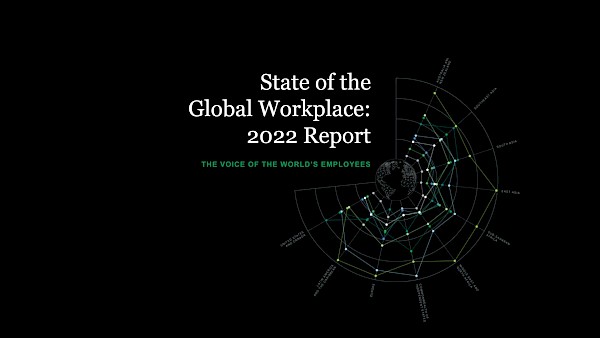Episode transcript The transcript is generated automatically by Podscribe, Sonix, Otter and other electronic transcription services.
Hello everyone. Welcome to the 5 Minutes podcast. Today I'd like to discuss the report that Gallup just published called The State of the Global Workplace 2022. And I have been following this report for quite a while, and this report is for me in some ways the reference on how I see the workplace, and this report I need to share it with you. It's for me disturbing. The 2022 report mentioned that 60% of the global workforce is detached. 60%, 19% are what Gallup called miserable means they are actively disengaged. If we add up these two points, this is 79% of the workforce. And please press pause on this podcast and take a look on your site and take a look at the floor you are working on right now or maybe on the video conferencing. And imagine that out of ten people you are seeing, eight of them are not connected to what you are doing. And it is so critical to understand, even knowing that the report shows that the engagement is growing. Of course, last year in the year before, we had the massive challenge of COVID, and I'm not saying that we don't have it now, but it was on another scale. So the engagement is back from 12 to 21, so it's growing. But however, when we think that only 21% of our workforce is engaged, this is depressing. You know this is depressing. So we need to understand what is happening. And then the report showed that different countries have different levels of engagement.
For example, in the United States, the number that is in Global 21 goes up to 33%. In Europe, it goes down to 14%. So imagine for European companies, out of ten people, less than two are truly engaged another point. The stress reached an all-time high. 44% of every single workplace employee is stressed, 44%, I'm talking 44%. So this is an all-time high since they started this research. And just to wrap up, when we talk about money, compensation, and living comfortably, only 22% of all the people that were interviewed mentioned that they are living receiving enough compensation to have a decent life. The top one was Australia with 55% and the bottom one was the sub-Saharan region with 10%. So imagine out of ten people, only one believes that what he or she is receiving is enough to have a decent life. I'm not talking about being wealthy or being rich. I know that many of you that are listening to this podcast, will not read this report. This report is quite big, but it's nice. It's nice for you to read and it's free. You can download this at Gallup and read it, but I know 170 pages is a lot of pages. But if you don't have time, just go and read the three first pages. The introduction was written by the CEO of Gallup, John Clifton because he did an amazing summary on how the workforce has been perceived today and why I'm saying this because when we are working in a project environment trying to deliver new products, trying to deliver new services, trying to innovate, it becomes very hard for you to innovate and trying to make your boat move to one direction, when only to people who are really, really working hard and the other eight people who are just trying to find ways of getting to a new position or a new job.
So think always about that in this report and let's try to work hard to change that in our department, in our area, and in our project. And look, there are companies that are doing this with excellence. And this is the other topic I want to mention to you. I am extremely happy that Willie just published my new book. It's my book, number 16. And this book is very special. This book is called Project Management Next Generation, and it was written by the author of the first book I read in project management, you know, and it's for me, it's such an honor. It's written together with Professor Harold Kerzner and my great friend Al Zeitoun from PMI. So we work together raising. Use this in cases from Philips, GM, Bosch, Progressive, Siemens, Dubai, Customs, IBM, SunRice, and all sorts of companies where we try to see to that cases how organizational excellence through projects can be put in place to solve this.
So I hope you really enjoy the book and enjoy the podcast see you next week with another 5 Minutes Podcast.

